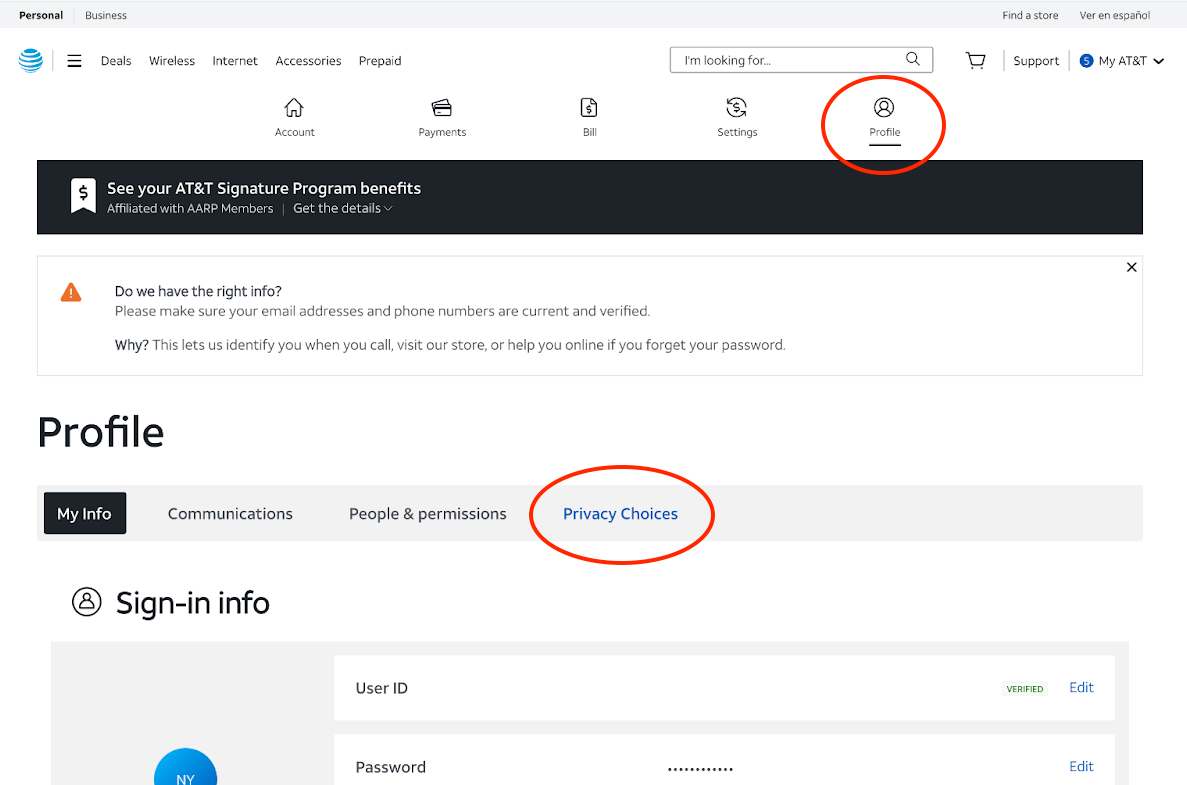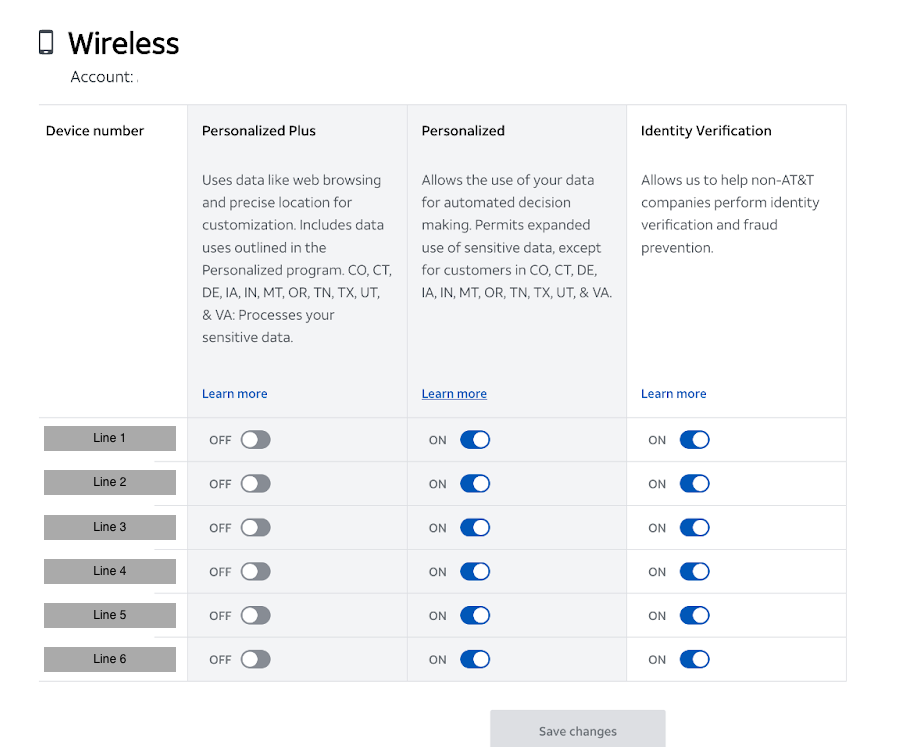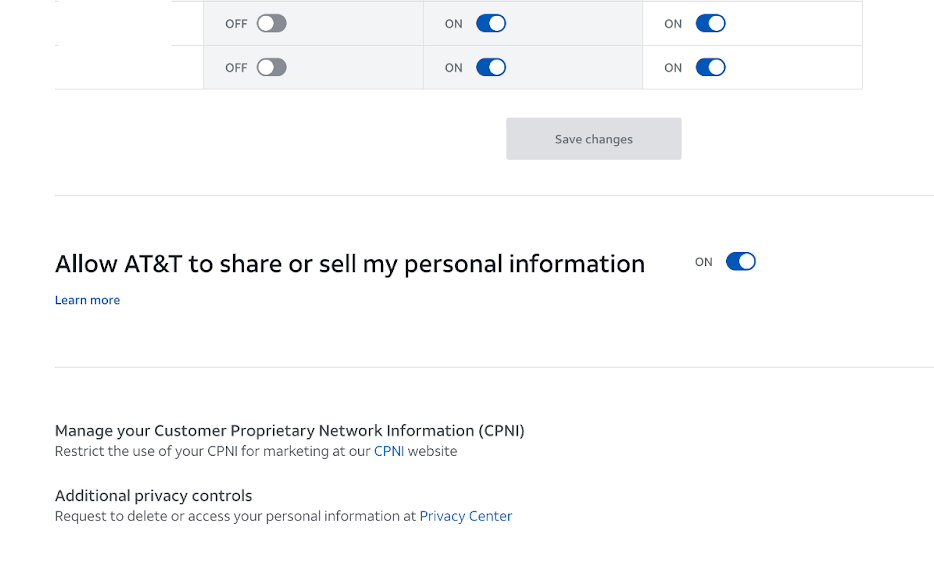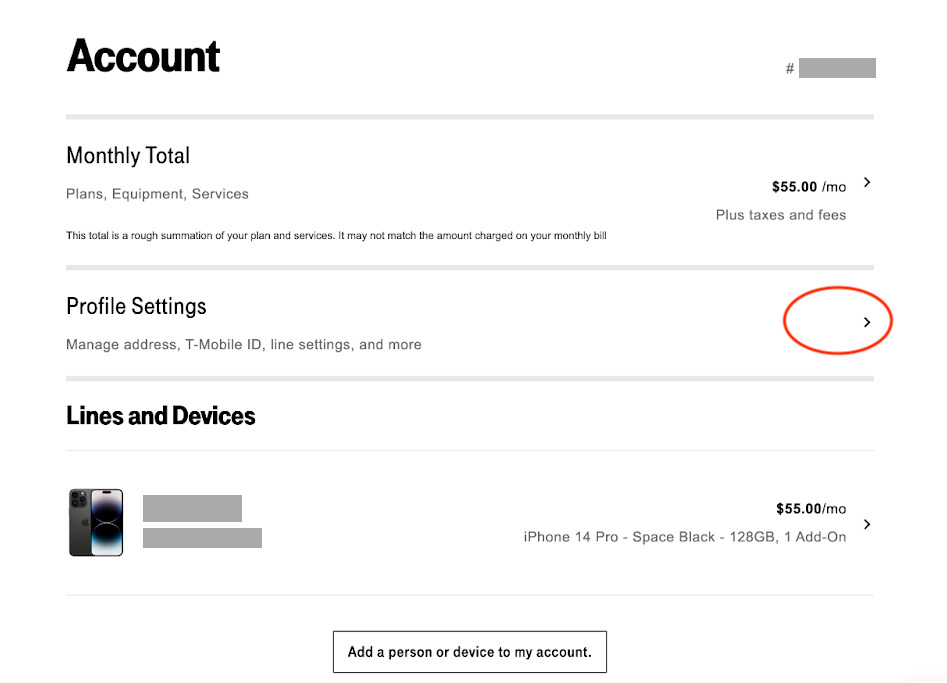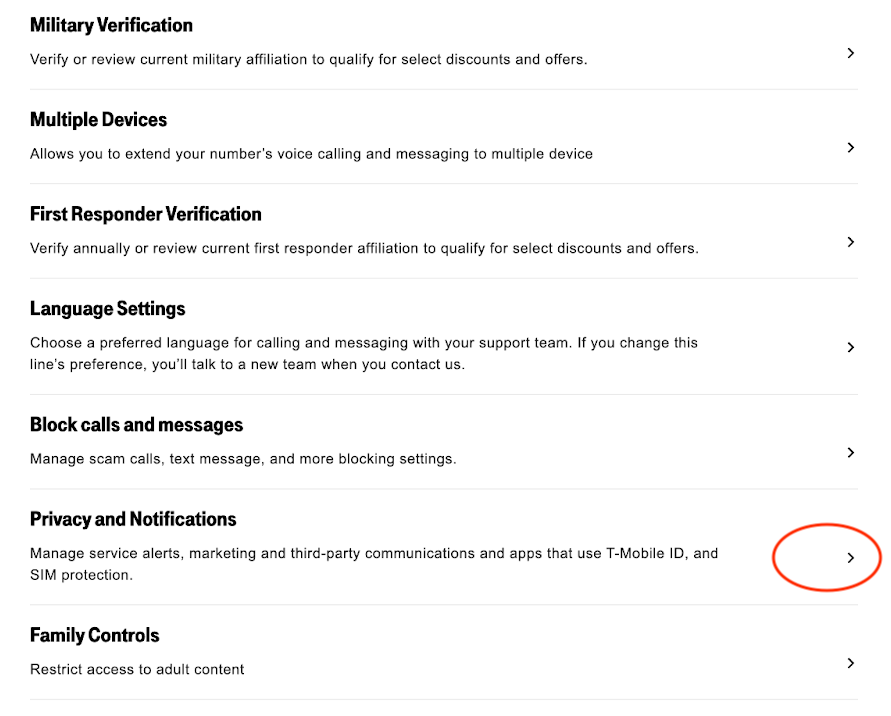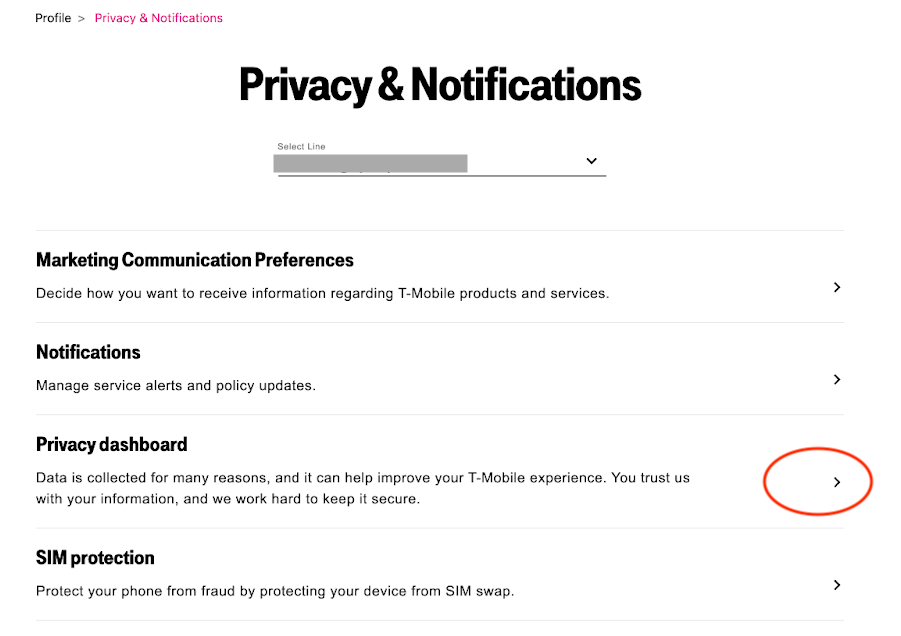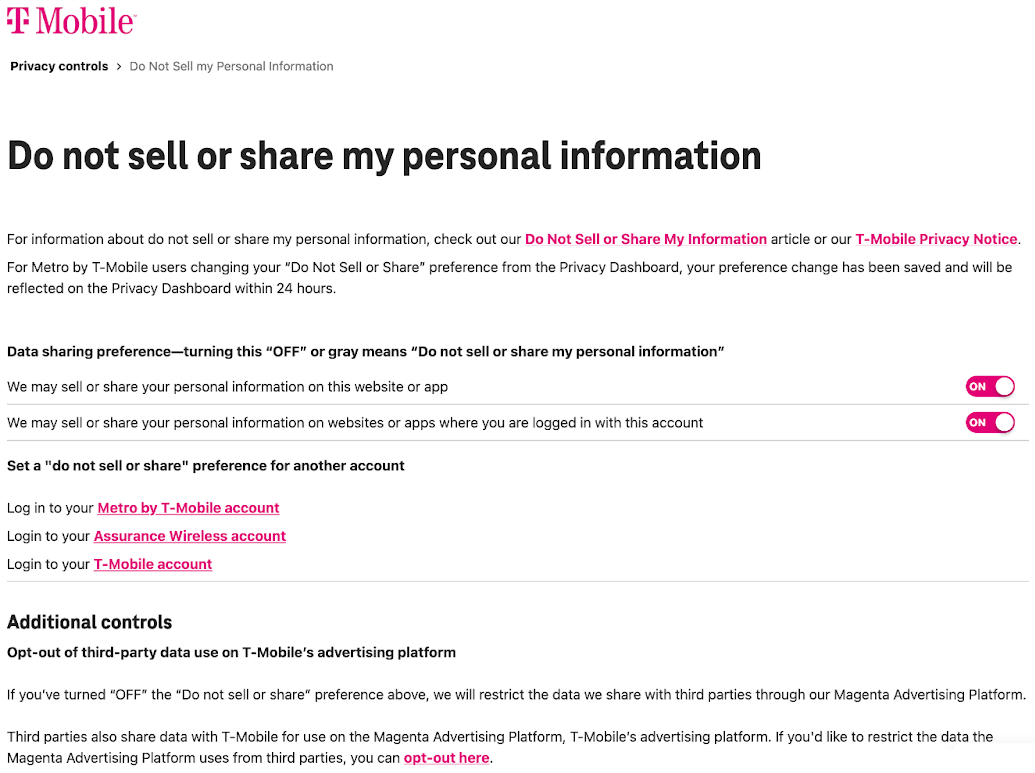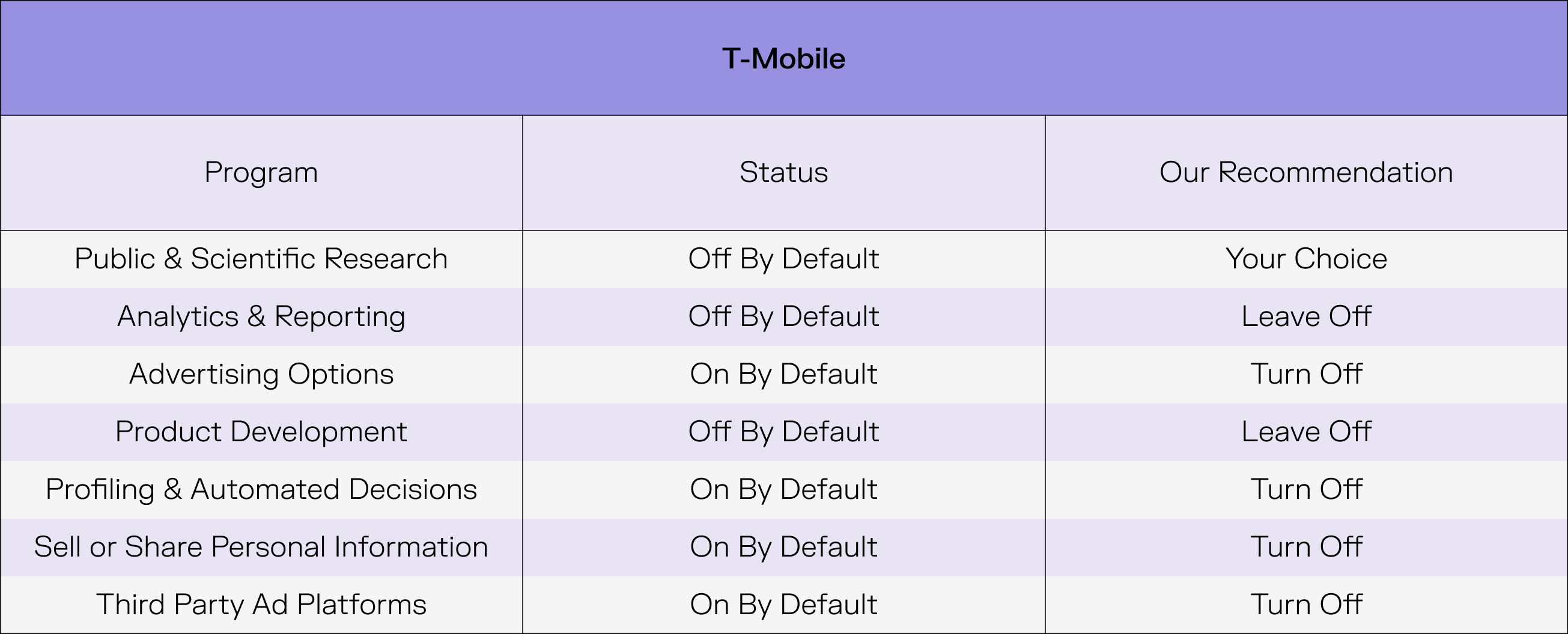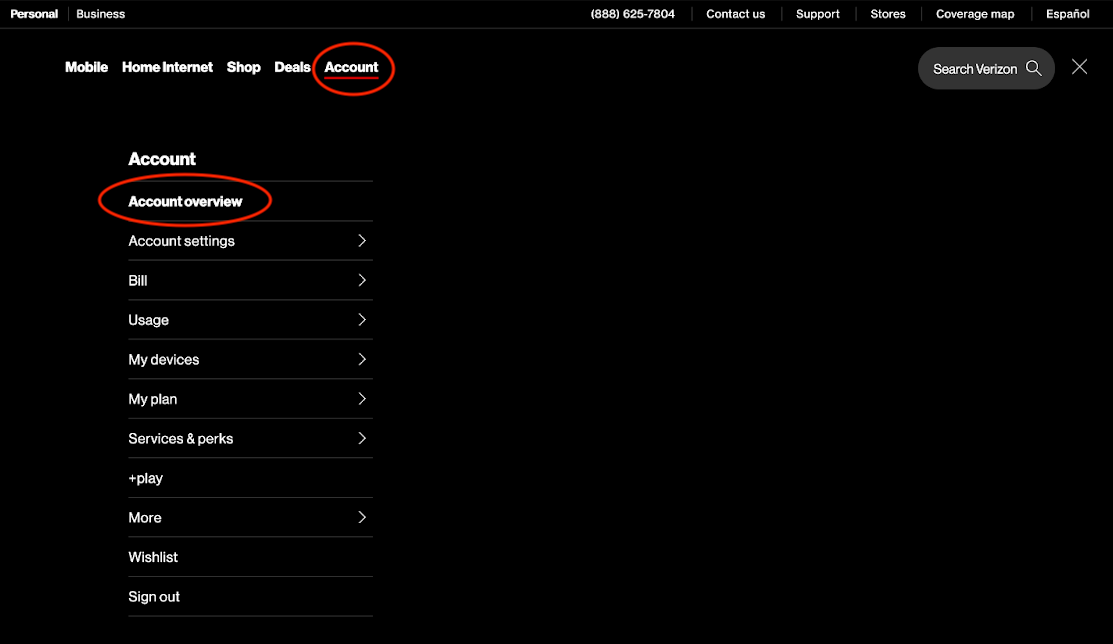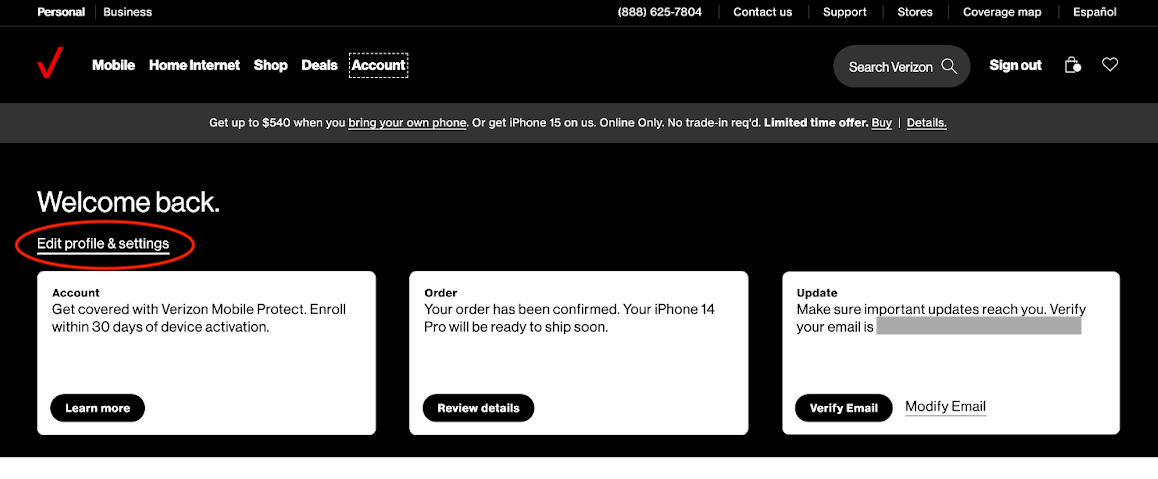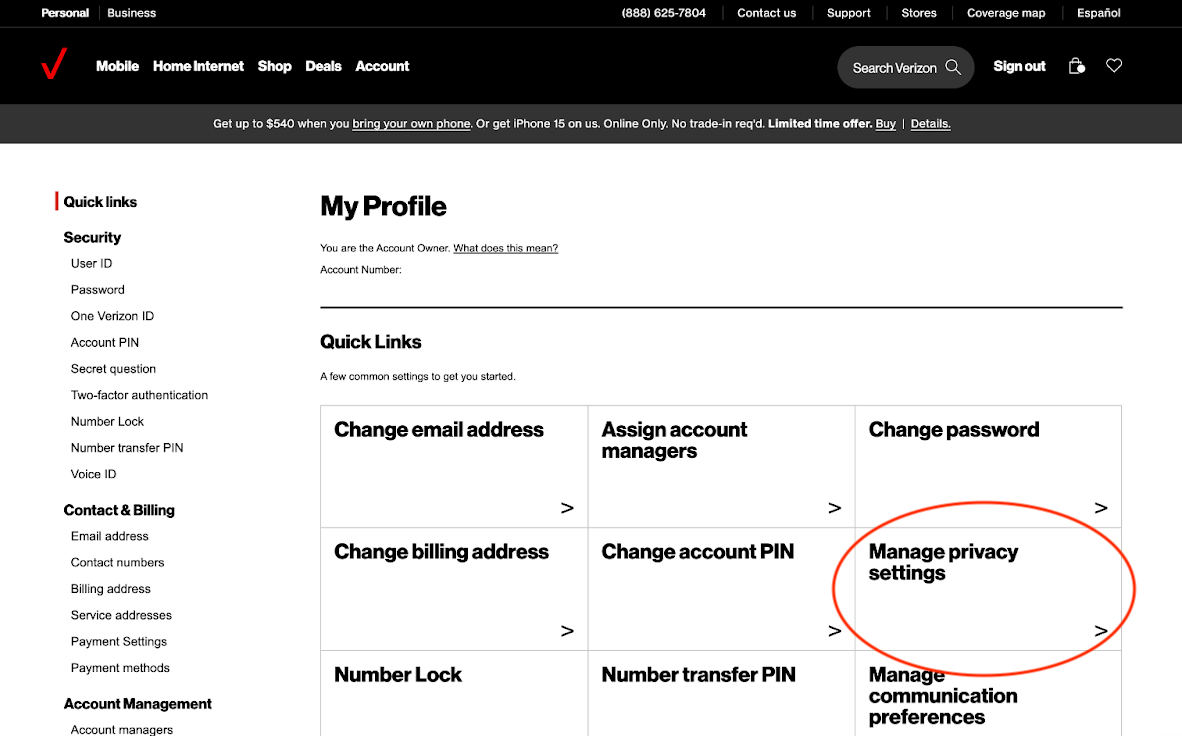Your mobile carrier knows a lot about you.
From call patterns, website visits, data transactions, app usage, real-time and historical location, search queries, and more, the sheer volume and granularity of the information your carrier collects about you is enough to create a robust user profile, which they can (and do) sell to the multi-billion dollar data broker industry, governments for warrantless surveillance programs, and third parties for ad targeting.
Many of us are aware that our data is likely being collected and sold to retailers, app developers, and other businesses to create targeted ads and improve online marketing strategies. But what is often swept under the rug is how our data can land in the hands of more nefarious entities, and how this process is a critical part of our cell carrier’s business models.
In April, the FCC issued a $200M fine against major carriers for illegally sharing access to customer location data. Location data is among the most sensitive types of data about you, yet it is frequently collected and monetized by carriers, and has even ended up in the hands of bounty hunters, loan sharks, and others who could apply the information in harmful ways.
I don’t remember giving my carrier consent!
Telco giants get your consent when you sign up for their service and agree to the Terms of Service and Privacy Policy. These documents are often lengthy and full of jargon, so most customers choose not to read them. In fact, visits to privacy policies of carriers averages between 0.5% to 6.7% of all total subscribers, depending on the carrier.
Even if customers do read and understand these privacy policies, carriers aren’t always transparent about how they use customer data. Many telecom companies assure consumers that they “will not sell your personal information,” yet consumers may not understand the process by which telcos buy consumer data from other data brokers, use it to infer additional information about them, categorize them into segments, and serve targeted ads to them on behalf of third parties, effectively still monetizing their data.
Carriers are also known to introduce new data collection and tracking programs, which they automatically enroll their customers into without informing them. For instance, T-Mobile recently introduced a new AI “Profiling” privacy program, allowing it to process user data to “evaluate, analyze, or predict certain personal aspects about your performance at work, economic situation, health, personal preferences, interests, reliability, behavior, location, or movements.”
If you’re subscribed to AT&T, Verizon, or T-Mobile, you’ve likely been automatically opted into their data sharing and monetization programs. Below, we provide more detail about each carrier's data privacy programs, and how you can adjust your settings to match your preferences.
AT&T
To view and change your privacy settings, log into your AT&T account on the AT&T website.
Click “Profile,” followed by “Privacy Choices.” You will see three main Privacy programs, with toggles to adjust settings for each of the lines on your plan.
- The Personalized Plus program enables AT&T to share data with advertising partners, use your precise location and Customer Proprietary Network Information (CPNI, explained below), and infer the websites you visit, to serve you ads that are relevant to your interests. Under this program, customers who live in certain states also risk sharing sensitive personal information, such as racial origin, with AT&T and its partners. This program is off by default, and we recommend leaving it off.
- The Personalized program allows AT&T to use your data, including your personal information like age range, ethnicity, and product and service usage, to “help customize your experience,” essentially using your data to serve you ads more relevant to your interests. This program is on by default. We recommend toggling it off for each of your lines.
- The Identity verification setting allows AT&T to share limited information about you with non-AT&T companies, such as banks, to help protect your accounts from fraud and verify your identity before authorizing transactions. It is on by default, and we recommend leaving it on.
Remember to save your changes after making adjustments. Below these three programs, you will see further privacy settings that you can adjust.
Allow AT&T to share or sell my personal information: This setting allows AT&T to sell or share your information with other companies “in limited ways” for advertising and marketing. This includes exchanging subscriber lists for joint marketing programs. It is on by default, and we recommend toggling it off.
Customer Proprietary Network Information (CPNI): CPNI refers to information about your subscription plan and call details (including time, duration, destination, and location). Carriers collect CPNI to conduct business operations, prevent fraud, and comply with legal requirements. They can also use it to market new services and promotions to their customers. Under federal law, customer approval is not required if carriers only use CPNI for these purposes. If carriers use or share CPNI in other ways, such as with external parties for marketing and advertising, they must obtain your consent before doing so. CPNI sharing is on by default. We recommend turning it off.
Visit AT&T’s CPNI website, and enter your billing account number and zip code to opt out.
T-Mobile
T-Mobile has a wider menu of privacy options. To access the Privacy Center, log into your T-Mobile account on the T-Mobile website, click on “Account” and navigate to “Profile Settings”, followed by “Privacy and Notifications”, and “Privacy Dashboard.”
From there, you will see six different settings with controls you can adjust.
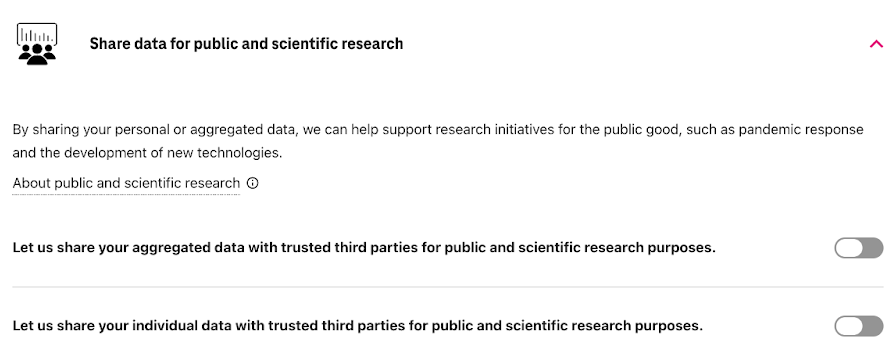 Public and scientific research: This program allows T-Mobile to share customer data with academic institutions or public interest organizations for “public and scientific research purposes.” The carrier says that all research institutions are vetted for credibility and that agreements specify strict requirements for how data can be used. To participate, you will need to opt-in. You can choose whether to participate in this program or not.
Public and scientific research: This program allows T-Mobile to share customer data with academic institutions or public interest organizations for “public and scientific research purposes.” The carrier says that all research institutions are vetted for credibility and that agreements specify strict requirements for how data can be used. To participate, you will need to opt-in. You can choose whether to participate in this program or not. Analytics and reporting: Under this program, T-Mobile collects data about device and app usage, such as how long apps are open and how often you open them. The carrier may also use other data like age range and gender.
Analytics and reporting: Under this program, T-Mobile collects data about device and app usage, such as how long apps are open and how often you open them. The carrier may also use other data like age range and gender.
This data is collected so T-Mobile can “look for patterns to better understand your interests, behaviors, and trends.” The data analysis is entered into a report, which is used internally and also sold to other companies. T-Mobile states that the data collected is aggregated and comprehensive steps are taken to prevent shared reports and analytics from containing data that directly identifies individuals. We recommend opting out.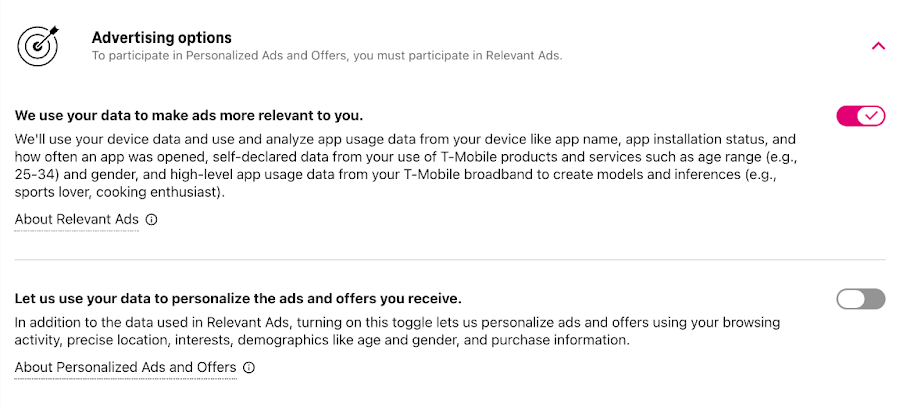 Advertising Options: This allows T-Mobile to collect device data and app usage data, combined with personal data like your age and gender to infer your interests and serve you tailored ads. The setting for relevant ads is on by default. You can opt in to more personalized ads by sharing browsing activity, location, interests, demographics, and purchase information. We recommend toggling both off.
Advertising Options: This allows T-Mobile to collect device data and app usage data, combined with personal data like your age and gender to infer your interests and serve you tailored ads. The setting for relevant ads is on by default. You can opt in to more personalized ads by sharing browsing activity, location, interests, demographics, and purchase information. We recommend toggling both off.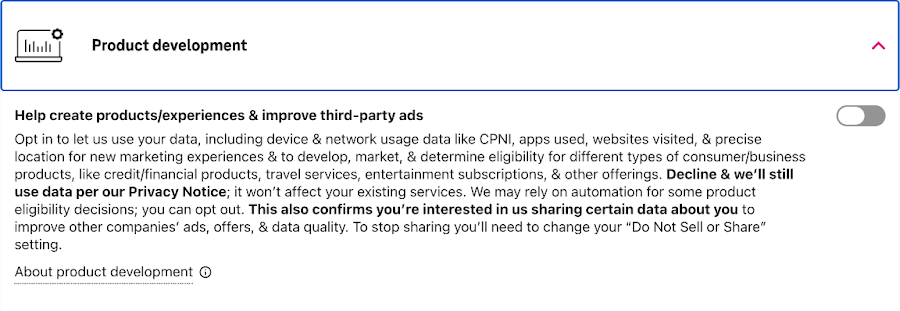 Product Development: This allows T-Mobile to use your device, network usage, CPNI, app, website, and location data to develop marketing strategies and experiences, and improve third-party ads. This setting is off by default. We recommend leaving it off. However, to prevent your data from being shared to third-parties completely, you’ll need to change your “Do Not Sell or Share” setting, which you’ll see further down.
Product Development: This allows T-Mobile to use your device, network usage, CPNI, app, website, and location data to develop marketing strategies and experiences, and improve third-party ads. This setting is off by default. We recommend leaving it off. However, to prevent your data from being shared to third-parties completely, you’ll need to change your “Do Not Sell or Share” setting, which you’ll see further down. Profiling and automated decisions: This permits T-Mobile to automatically process customers' personal data to “evaluate, analyze, or predict” personal aspects of their lives, health, financial status, and more. It is unclear what T-Mobile is planning to use this information for as the carrier merely states that the data will be used “for certain kinds of “profiling” that [it] might do in the future”. This setting is on by default, and we recommend toggling it off.
Profiling and automated decisions: This permits T-Mobile to automatically process customers' personal data to “evaluate, analyze, or predict” personal aspects of their lives, health, financial status, and more. It is unclear what T-Mobile is planning to use this information for as the carrier merely states that the data will be used “for certain kinds of “profiling” that [it] might do in the future”. This setting is on by default, and we recommend toggling it off. Do Not Sell or Share My Personal Information: Under this program, T-Mobile may use your data “for targeted advertising or for third parties to use for direct marketing.” If you do not want T-Mobile to sell or share your personal information, you will need to click “Manage Do Not Sell or Share,” which will redirect you to the following page:
Do Not Sell or Share My Personal Information: Under this program, T-Mobile may use your data “for targeted advertising or for third parties to use for direct marketing.” If you do not want T-Mobile to sell or share your personal information, you will need to click “Manage Do Not Sell or Share,” which will redirect you to the following page:
We recommend toggling everything off. You can also opt-out of data sharing through T-Mobile’s advertising platform, Magenta, by clicking the opt-out link at the bottom.
Verizon
To manage your privacy settings, log in to your Verizon account on the website, click on “Account,” and then “Account Overview.” From there, select “Edit Profile and Settings” and choose “Manage Privacy Settings.”
There are 5 privacy settings that you can adjust.
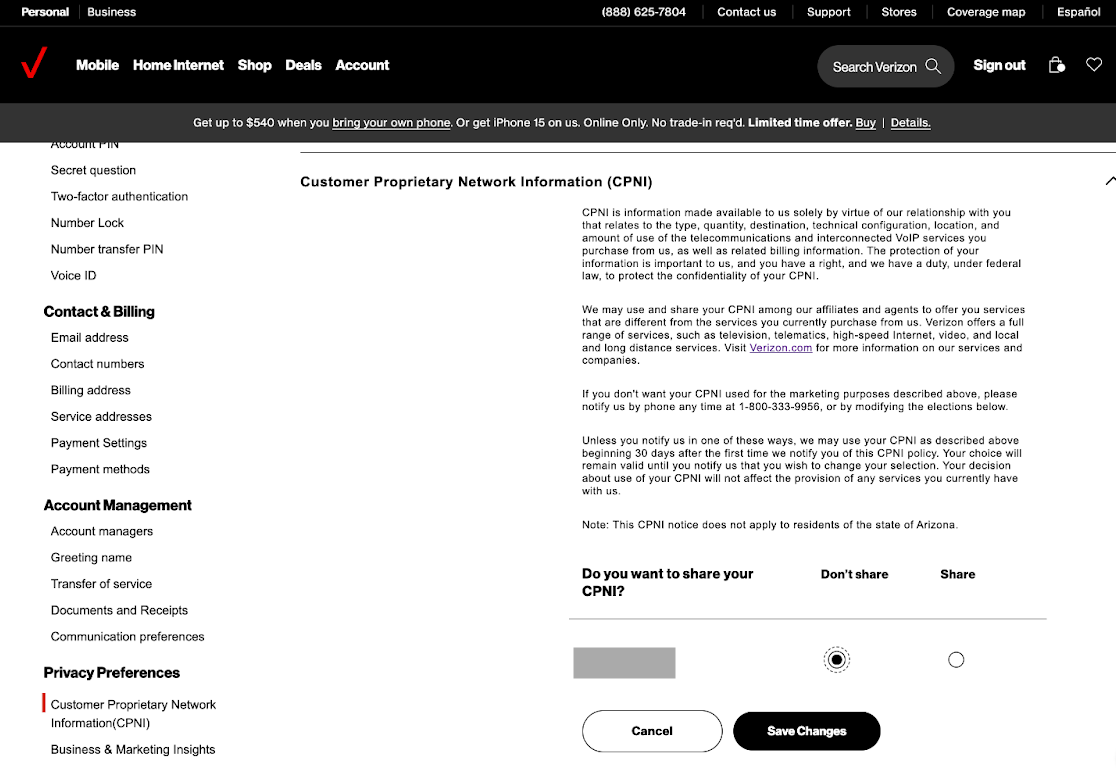 CPNI: Like AT&T and T-Mobile, Verizon uses CPNI for operational, fraud prevention, and legal compliance purposes. But the carrier says it may also use and share your CPNI among its affiliates and agents to offer other services to you “offer you services that are different from the services you currently purchase from us.” On top of mobile services, Verizon also offers television, internet, and video services, so it. This means Verizon may also use your CPNI to market non-mobile-related services to you. We recommend selecting “Don’t share.”
CPNI: Like AT&T and T-Mobile, Verizon uses CPNI for operational, fraud prevention, and legal compliance purposes. But the carrier says it may also use and share your CPNI among its affiliates and agents to offer other services to you “offer you services that are different from the services you currently purchase from us.” On top of mobile services, Verizon also offers television, internet, and video services, so it. This means Verizon may also use your CPNI to market non-mobile-related services to you. We recommend selecting “Don’t share.”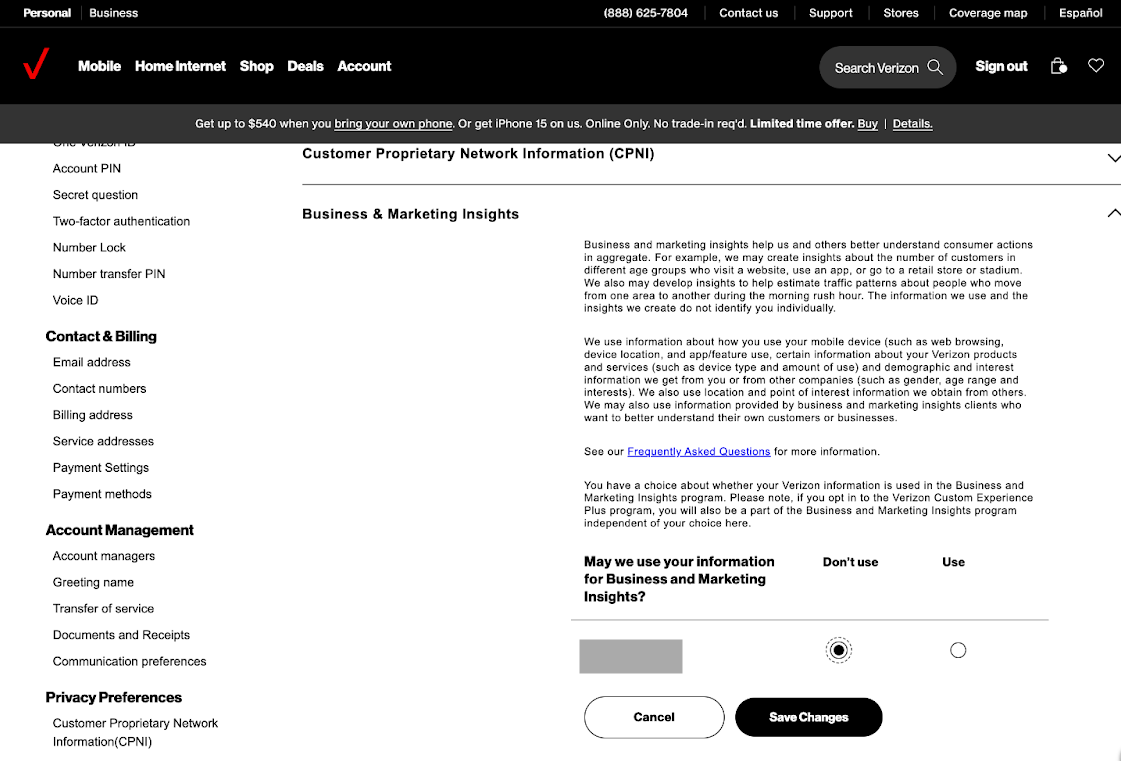 Business and marketing insights: Verizon collects various types of data under this program, including personal information (e.g., gender, age range, interests), device and app usage data (e.g., web addresses you visit, apps on your device), and location information. This information does not identify individuals but is combined and analyzed for insights, which are then shared with vendors and partners who work for Verizon. We recommend selecting “Don’t use.”
Business and marketing insights: Verizon collects various types of data under this program, including personal information (e.g., gender, age range, interests), device and app usage data (e.g., web addresses you visit, apps on your device), and location information. This information does not identify individuals but is combined and analyzed for insights, which are then shared with vendors and partners who work for Verizon. We recommend selecting “Don’t use.”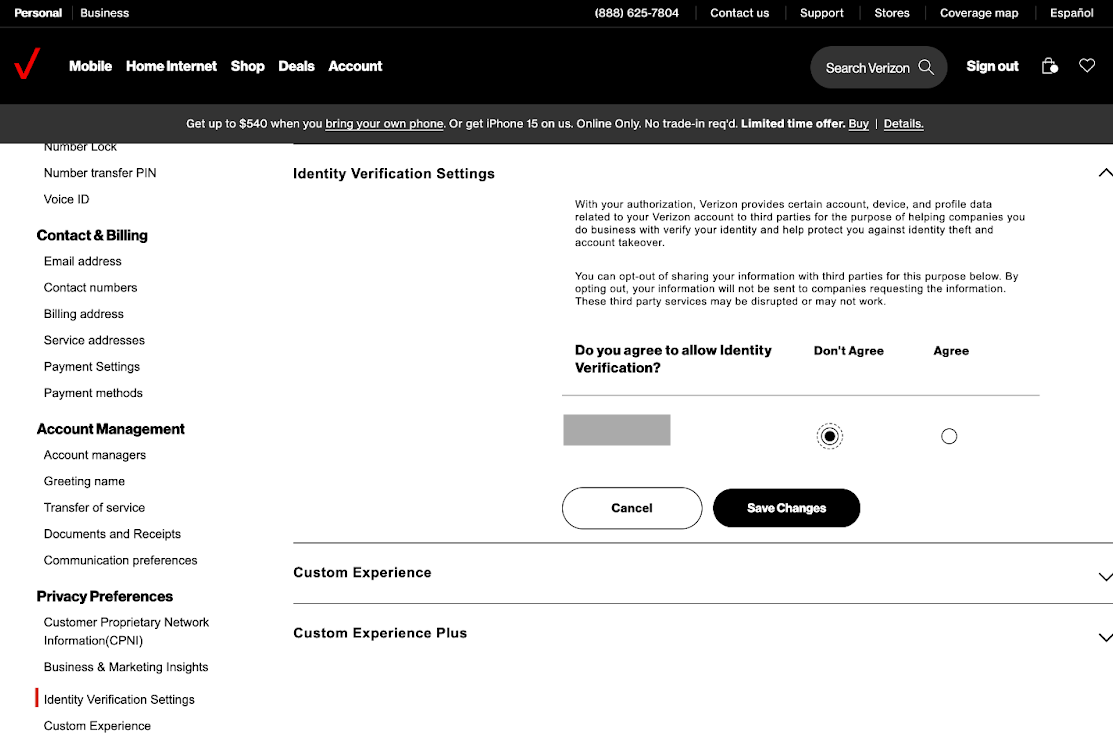 Identity verification: Similar to AT&T’s Identity Verification service, Verizon uses this feature to help protect you against theft and fraud. For example, your account, device, and profile data are used to help your bank confirm your identity. We recommend selecting “Agree,” as this feature is helpful to protect your identity.
Identity verification: Similar to AT&T’s Identity Verification service, Verizon uses this feature to help protect you against theft and fraud. For example, your account, device, and profile data are used to help your bank confirm your identity. We recommend selecting “Agree,” as this feature is helpful to protect your identity.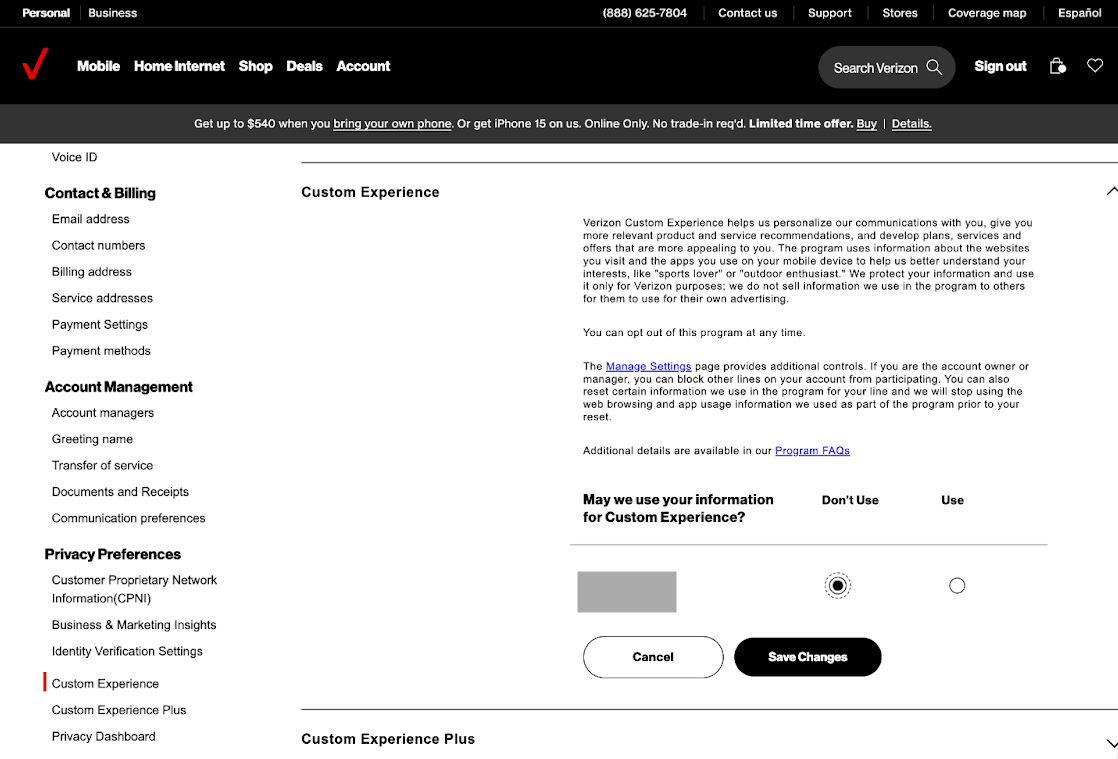 Custom experience: Customers are automatically enrolled into this program, which allows Verizon to track data on device and app use, and collect information about the websites you visit. This information helps Verizon determine customer interests, preferences, and insights so it can “personalize” their communications with you and serve you more relevant ads. We recommend selecting “Don’t Use.”
Custom experience: Customers are automatically enrolled into this program, which allows Verizon to track data on device and app use, and collect information about the websites you visit. This information helps Verizon determine customer interests, preferences, and insights so it can “personalize” their communications with you and serve you more relevant ads. We recommend selecting “Don’t Use.”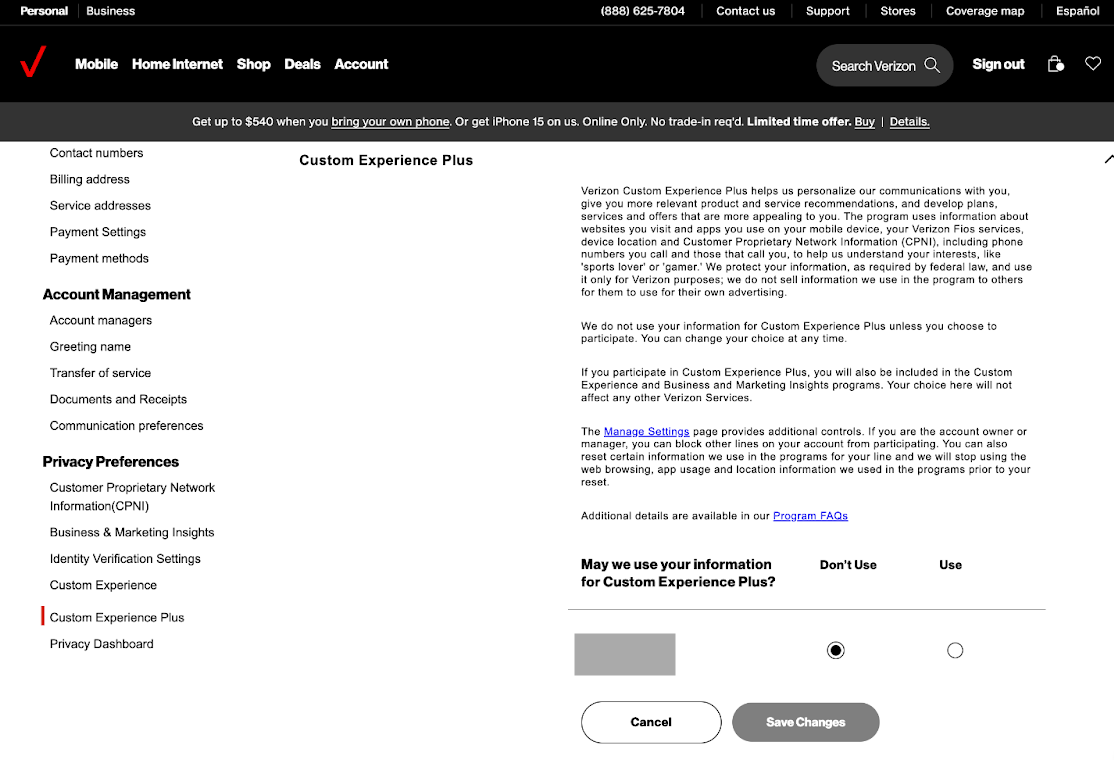 Custom experience plus: On top of the information Verizon collects under Custom Experience, the ‘Plus’ version also collects device location information and CPNI. With a broader range of information available to the carrier, customers who opt in to this program “get the most personalized content and marketing.” We recommend selecting “Don’t Use.”
Custom experience plus: On top of the information Verizon collects under Custom Experience, the ‘Plus’ version also collects device location information and CPNI. With a broader range of information available to the carrier, customers who opt in to this program “get the most personalized content and marketing.” We recommend selecting “Don’t Use.”
In their privacy notices, all three carriers mention the comprehensive measures they've put in place to ensure your data is protected. However, the $200 million fines that the FCC slapped on all three carriers in April 2024 tell us these practices are still insufficient and ineffective.
Seem like a lot of steps to take just to opt out of sharing your own personal data?
Cape makes it easy to protect your privacy. We take several measures to ensure that our customers have high-quality cell service without having to compromise their personal information and privacy. Because believe it or not, carriers do not need most of this information about you in order to provide you with service.
Cape provides customers with a clean, easy-to-understand Privacy Policy, which we want you to read, so you know exactly what you are signing up for. Additionally, will never opt you in to sharing your personal information with third-parties, and will never sell your data, period. And finally, Cape only collects the minimum amount of personal information required to provide you with cell service, so even if we wanted to share your data, we would not be able to.
Switch to Cape today.

